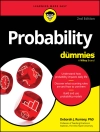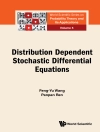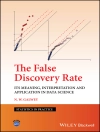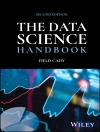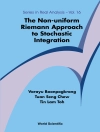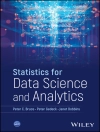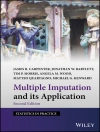A practical and clarifying approach to aging and
aging-related diseases
Providing a thorough and extensive theoretical framework, The
Biostatistics of Aging: From Gompertzian Mortality to an Index of
Aging-Relatedness addresses the surprisingly
subtlenotion–with consequential biomedical and public health
relevance–of what it means for acondition to be related to
aging. In this pursuit, the book presents a new quantitative
methodto examine the relative contributions of genetic and
environmental factors to mortality anddisease incidence in a
population.
With input from evolutionary biology, population genetics,
demography, and epidemiology, this medically motivated book
describes an index of aging-relatedness and also features:
* Original results on the asymptotic behavior of the minimum of
time-to-event random variables, which extends those of the
classical statistical theory of extreme values
* A comprehensive and satisfactory explanation based on
biological principles of the Gompertz pattern of mortality in human
populations
* The development of an evolution-based model of causation
relevant to mortality and aging-related diseases of complex
etiology
* An explanation of how and why the description of human
mortality by the Gompertz distribution can be improved upon from
first principles
* The amply illustrated analysis of real-world data, including a
program for conducting the analysis written in the freely available
R statistical software
* Technical appendices including mathematical material as well as
an extensive and multidisciplinary bibliography on aging and
aging-related diseases
The Biostatistics of Aging: From Gompertzian Mortality to an
Index of Aging-Relatedness is an excellent resource for
practitioners and researchers with an interest in aging and
aging-related diseases from the fields of medicine, biology,
gerontology, biostatistics, epidemiology, demography, and public
health.
Зміст
PREFACE AND ACKNOWLEDGMENT ix
1 Introduction 1
2 An Account of Gompertzian Mortality through Statistical and
Evolutionary Arguments 6
2.1 The Statistical Theory of Extreme Values 10
2.2 The Evolutionary Theory of Aging 36
3 The Argument against Gompertzian Mortality 69
3.1 Departures from the Gompertz Model 70
3.2 An Evolution-Based Model of Causation 72
4 The Index of Aging-Relatedness 93
4.1 A Survival Mixture Model of the Gompertz and Weibull
Distributions 94
4.2 Definition and Interpretation of the Index of
Aging-Relatedness 97
4.3 The Survival Mixture Model and Competing Risks 103
4.4 Estimation of the Model Parameters 107
4.5 Illustrative Application: The Israeli Ischemic Heart Disease
Study 109
4.6 Precision of Estimation 122
5 Discussion: Implications 128
5.1 The Meaning of the Gompertz Parameter 128
5.2 Age as a Risk Factor for Disease 132
5.3 Are Aging-Related Diseases an Integral Part of Aging?
134
5.4 Biological versus Chronological Aging 135
5.5 The Public Health Notion of Compression of Morbidity 138
5.6 A Picture of Aging for the Twenty-First Century 143
APPENDIX A: PROOFS OF RESULTS IN SECTION 2.1.2 WITH SOME
EXTENSIONS 154
APPENDIX B: DERIVATION OF HAMILTON’S EQUATION FOR THE
FORCE OF NATURAL SELECTION ON MORTALITY 170
APPENDIX C: SOME PROPERTIES OF THE GOMPERTZ AND WEIBULL
DISTRIBUTIONS 174
APPENDIX D: FIRST AND SECOND PARTIAL DERIVATIVES OF THE
MIXTURE LOG-LIKELIHOOD FUNCTION 178
APPENDIX E: EXPECTATION-CONDITIONAL MAXIMIZATION (ECM)
ALGORITHM 183
APPENDIX F: R PROGRAM 190
REFERENCES 226
AUTHOR INDEX 245
SUBJECT INDEX 253
Про автора
GILBERTO LEVY, MD, DRPH, is a neurologist
with a primary research interest in aging and aging-related
diseases, particularly dementia. He conducted clinical research
within the spheres of epidemiological studies and clinical trials
at Columbia University for more than ten years. Dr. Levy is the
author of over thirty journal articles and three book chapters.
BRUCE LEVIN, PHD, is Professor of
Biostatistics and past chair of the Department of Biostatistics in
the Mailman School of Public Health at Columbia University. A
Fellow of the American Statistical Association, his research
interests include sequential selection procedures and their use in
adaptive clinical trial designs. He is the coauthor (with J.L.
Fleiss and M.C. Paik) of Statistical Methods for Rates and
Proportions, Third Edition, published by Wiley.



